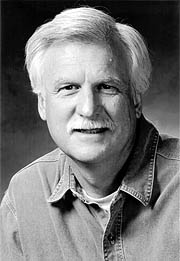
August 28, 2000
UCSC establishes new Department of Environmental Toxicology
By Tim Stephens
UCSC is widely recognized as a major center for research on lead and other toxic
elements in the environment, and the campus has now launched a new Department of
Environmental Toxicology that will address a broad range of issues concerning potentially
harmful chemicals and microbes in the environment.
 |
| Professor A. Russell Flegal chairs the new Department of Environmental Toxicology Photo: Don Harris |
"We want to identify the sources of toxicity in the environment and understand how they become a threat to organisms, including humans," said Professor A. Russell Flegal, who chairs the new department.
The department offers graduate programs leading to M.S. and Ph.D. degrees and undergraduate courses in environmental toxicology. With a growing range of interdisciplinary research programs, the department builds on UCSC's recognized strengths in environmental research. It also fills a distinctive niche among toxicology programs, most of which are associated with medical schools and focus primarily on human health, Flegal said.
In the past, graduate students working with Flegal and UCSC's other environmental toxicologists have received degrees in fields such as biology, marine sciences, or chemistry. Now they will all be in the same department, and that's an exciting development, said graduate student Allison Luengen.
"It brings together people who have been in different departments and provides a focal point for our work in environmental toxicology," said Luengen, who is completing her M.S. in marine sciences and will enter the Ph.D. program in environmental toxicology this fall.
Several of UCSC's environmental toxicologists have earned international reputations based on their work with trace elements in the environment. These include toxic heavy metals such as lead and mercury, as well as biologically essential elements, such as copper and manganese, that can be toxic at high concentrations.
Flegal and his colleages have documented heavy metal contamination in San Francisco Bay, the Great Lakes, Antarctica, Europe, and the deep waters of the North Atlantic. Their analyses have identified lead hazards in crystal decanters, plumbing fixtures, and calcium supplements, resulting in changes in how those products are made. The researchers have also helped establish standard procedures for measuring lead exposure in children and other vulnerable populations.
Members of the new department play a key role in developing new environmental policies and regulatory actions through collaborations with the U.S. Environmental Protection Agency (EPA), the California State Water Resources Control Board, and the California Attorney General's Office. For example, new EPA protocols for monitoring heavy metals in aquatic systems are based on methodologies developed at UCSC.
One of the factors that sets the campus apart from other institutions in this area of research is the availability of state-of-the-art analytical facilities for studying trace elements. Whether the concern is lead in a blood sample or nutrients in ocean water, performing accurate and precise measurements is often a major challenge. Highly sensitive instruments and specially designed clean labs at UCSC enable researchers to perform extremely sophisticated analyses.
"We have been leaders in establishing the use of isotopic tracers to identify the sources of lead contamination, and we can do that because of the facilities we have," said Donald Smith, an associate professor of environmental toxicology.
Smith is currently involved in several research projects addressing the health effects of lead and manganese. For example, he is collaborating with researchers in the Harvard School of Public Health and with Mexican public health authorities to assess the effects of environmental lead on pregnant women and their children in Mexico City. Smith has also been investigating the potential health effects of manganese because of its proposed use as a gasoline additive.
UCSC's environmental toxicology program is casting a wide net in its approach to environmental perils, investigating harmful microbes as well as chemical toxicants. Assistant Professor Karen Ottemann is studying how bacterial pathogens detect and respond to their host environments. Because harmful microorganisms are posing an increasing threat to public health, expertise in this field is a critical component of the new department, Flegal said.
Flegal hopes to further round out the department with new faculty. "We are recruiting experts in organic toxins and other areas, and we look forward to accepting a group of exceptional students with diverse interests and backgrounds into the graduate programs," Flegal said.
Return to Front Page